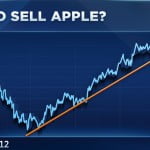With the Fed expected to raise interest rates on Wednesday, interest in the Fed itself is rising.
According to Google trends, U.S. Google searches for “The Federal Reserve” have been rising sharply since August. In fact, partial data for December show that more people are searching for the term this month than they ever have before, going back to at least 2004.

Interest in the term “Federal Reserve” (without the “the”) is also on the upswing — though far below where it was during the financial crisis.
The Federal Open Market Committee is widely expected to announce the first increase in its federal funds rate target in nearly a decade on Wednesday. And while that benchmark rate is not immediately accessible for all but a handful of financial institutions, the fed funds rate’s level and direction are thought to have widespread consequences on financial market and the economy.
Read MoreWall St. expects three more rate hikes in ’16: Survey
There’s another possible reason Americans are growing more curious about the Fed. The institution has become a whipping post on the campaign trail, with Republican presidential candidates Rand Paul and Ted Cruz taking issue with the Fed’s policies.
Either way, growing interest in the Fed is a good thing, according to Nicholas Colas, chief market strategist at Convergex.
“The Fed is a difficult construct, but If people are Googling it, hopefully they can go and read about it,” Colas said.
There may actually be some valuable insights to be gleaned from the level of interest in the institution.
When S&P Investment Advisory’s Erin Gibbs examined the Google trends chart for “Federal Reserve,” she found that “there were pretty strong negative correlations to the HYG, the high yield ETF. So as interest goes up, the HYG goes down.”
She also found that interest in the Federal Reserve is positively correlated to the CBOE Volatility Index, meaning that the search popularity and the VIX have tended to rise as the same time – perhaps because rocky markets have come alongside news headlines about the “Fed.”
[“source -cncb”]




